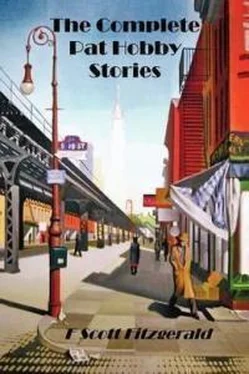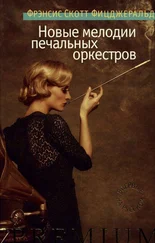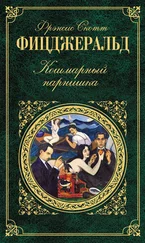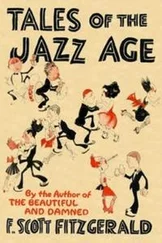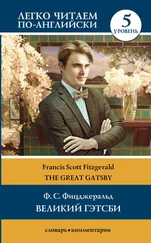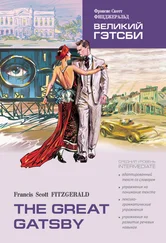'To hell with it,' said Pat disgustedly. 'Look—call Louie Griebel. What's all this about?'
'Orders from Mr Kasper,' said the clerk. 'Last week a visitor from Chicago fell in the wind machine—Hello. Mr Louie Griebel?'
'I'll talk to him,' said Pat, taking the phone.
'I can't do nothing, Pat,' mourned Louie. 'I had trouble getting my boy in this morning. Some twirp from Chicago fell in the wind machine.'
'What's that got to do with me?' demanded Pat vehemently.
He walked, a little faster than his wont, along the studio wall to the point where it joined the back lot. There was a guard there but there were always people passing to and fro and he joined one of the groups. Once inside he would see Jack and have himself excepted from this absurd ban. Why, he had known this lot when the first shacks were rising on it, when this was considered the edge of the desert.
'Sorry mister, you with this party?'
'I'm in a hurry,' said Pat. 'I've lost my card.'
'Yeah? Well, for all I know you may be a plain clothes man.' He held open a copy of a photo magazine under Pat's nose. 'I wouldn't let you in even if you told me you was this here Orson Welles.'
There is an old Chaplin picture about a crowded street car where the entrance of one man at the rear forces another out in front. A similar image came into Pat's mind in the ensuing days whenever he thought of Orson Welles. Welles was in; Hobby was out. Never before had the studio been barred to Pat and though Welles was on another lot it seemed as if his large body, pushing in brashly from nowhere, had edged Pat out the gate.
'Now where do you go?' Pat thought. He had worked in the other studios but they were not his. At this studio he never felt unemployed—in recent times of stress he had eaten property food on its stages—half a cold lobster during a scene from The Divine Miss Carstairs; he had often slept on the sets and last winter made use of a Chesterfield overcoat from the costume department. Orson Welles had no business edging him out of this. Orson Welles belonged with the rest of the snobs back in New York.
On the third day he was frantic with gloom. He had sent note after note to Jack Berners and even asked Louie to intercede—now word came that Jack had left town. There were so few friends left. Desolate, he stood in front of the automobile gate with a crowd of staring children, feeling that he had reached the end at last.
A great limousine rolled out, in the back of which Pat recognized the great overstuffed Roman face of Harold Marcus. The car rolled toward the children and, as one of them ran in front of it, slowed down. The old man spoke into the tube and the car halted. He leaned out blinking.
'Is there no policeman here?' he asked of Pat.
'No, Mr Marcus,' said Pat quickly. 'There should be. I'm Pat Hobby, the writer—could you give me a lift down the street?'
It was unprecedented—it was an act of desperation but Pat's need was great.
Mr Marcus looked at him closely.
'Oh yes, I remember you,' he said. 'Get in.'
He might possibly have meant get up in front with the chauffeur. Pat compromised by opening one of the little seats. Mr Marcus was one of the most powerful men in the whole picture world. He did not occupy himself with production any longer. He spent most of his time rocking from coast to coast on fast trains, merging and launching, launching and merging, like a much divorced woman.
'Some day those children'll get hurt.'
'Yes, Mr Marcus,' agreed Pat heartily, 'Mr Marcus—'
'They ought to have a policeman there.'
'Yes. Mr Marcus. Mr Marcus—'
'Hm–m–m!' said Mr Marcus. 'Where do you want to be dropped?'
Pat geared himself to work fast.
'Mr Marcus, when I was your press agent—'
'I know,' said Mr Marcus. 'You wanted a ten dollar a week raise.'
'What a memory!' cried Pat in gladness. 'What a memory! But Mr Marcus, now I don't want anything at all.'
'This is a miracle.'
'I've got modest wants, see, and I've saved enough to retire.'
He thrust his shoes slightly forward under a hanging blanket, The Chesterfield coat effectively concealed the rest.
'That's what I'd like,' said Mr Marcus gloomily. 'A farm—with chickens. Maybe a little nine–hole course. Not even a stock ticker.'
'I want to retire, but different,' said Pat earnestly. 'Pictures have been my life. I want to watch them grow and grow—'
Mr Marcus groaned.
'Till they explode,' he said. 'Look at Fox! I cried for him.' He pointed to his eyes, 'Tears!'
Pat nodded very sympathetically.
'I want only one thing.' From the long familiarity he went into the foreign locution. 'I should go on the lot anytime. From nothing. Only to be there. Should bother nobody. Only help a little from nothing if any young person wants advice.'
'See Berners,' said Marcus.
'He said see you.'
'Then you did want something,' Marcus smiled. 'All right, all right by me. Where do you get off now?'
'Could you write me a pass?' Pat pleaded. 'Just a word on your card?'
'I'll look into it,' said Mr Marcus. 'Just now I've got things on my mind. I'm going to a luncheon.' He sighed profoundly. 'They want I should meet this new Orson Welles that's in Hollywood.'
Pat's heart winced. There it was again—that name, sinister and remorseless, spreading like a dark cloud over all his skies.
'Mr Marcus,' he said so sincerely that his voice trembled, 'I wouldn't be surprised if Orson Welles is the biggest menace that's come to Hollywood for years. He gets a hundred and fifty grand a picture and I wouldn't be surprised if he was so radical that you had to have all new equipment and start all over again like you did with sound in 1928.'
'Oh my God!' groaned Mr Marcus.
'And me,' said Pat, 'all I want is a pass and no money—to leave things as they are.'
Mr Marcus reached for his card case.
To those grouped together under the name 'talent', the atmosphere of a studio is not unfailingly bright—one fluctuates too quickly between high hope and grave apprehension. Those few who decide things are happy in their work and sure that they are worthy of their hire—the rest live in a mist of doubt as to when their vast inadequacy will be disclosed.
Pat's psychology was, oddly, that of the masters and for the most part he was unworried even though he was off salary. But there was one large fly in the ointment—for the first time in his life he began to feel a loss of identity. Due to reasons that he did not quite understand, though it might have been traced to his conversation, a number of people began to address him as 'Orson'.
Now to lose one's identity is a careless thing in any case. But to lose it to an enemy, or at least to one who has become scapegoat for our misfortunes—that is a hardship. Pat was NOT Orson. Any resemblance must be faint and far–fetched and he was aware of the fact. The final effect was to make him, in that regard, something of an eccentric.
'Pat,' said Joe the barber, 'Orson was in here today and asked me to trim his beard.'
'I hope you set fire to it,' said Pat.
'I did,' Joe winked at waiting customers over a hot towel. 'He asked for a singe so I took it all off. Now his face is as bald as yours. In fact you look a bit alike.'
This was the morning the kidding was so ubiquitous that, to avoid it, Pat lingered in Mario's bar across the street. He was not drinking—at the bar, that is, for he was down to his last thirty cents, but he refreshed himself frequently from a half–pint in his back pocket. He needed the stimulus for he had to make a touch presently and he knew that money was easier to borrow when one didn't have an air of urgent need.
His quarry, Jeff Boldini, was in an unsympathetic state of mind. He too was an artist, albeit a successful one, and a certain great lady of the screen had just burned him up by criticizing a wig he had made for her. He told the story to Pat at length and the latter waited until it was all out before broaching his request.
Читать дальше
